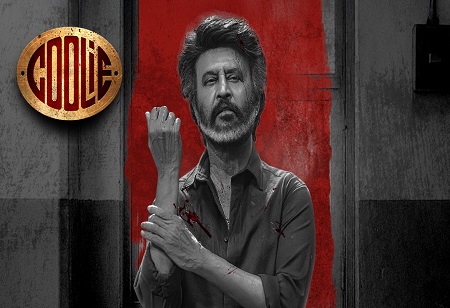Coolie: When Aura Outshines the Script
A film with the biggest superstar of the country, backed by a spectacular ensemble cast, a top production house, and arguably the most wanted director in the industry, Coolie was easily one of the most anticipated films of the year.
Films of this stature naturally attract overwhelming hype, but they also risk crumbling under that same weight. Often, mass moments and elevation scenes are used to cover logical gaps and loose ends, but when they fail to land, the film can collapse and Coolie seems to be one such film. Is Coolie an outright bad film? Not really. But is it great? Nowhere close.
The more you think about this film, the more it starts to annoy you. Lokesh Kanagaraj’s earlier works could all be summed up in a line: Master was the journey of a drunk professor who stands up to injustice at a juvenile home.
Kaithi was a one-night thriller of a convict trying to meet his daughter for the first time. Vikram was about a retired agent returning to dismantle a drug syndicate. But with Coolie, there isn’t a definitive one-line pitch. From the promotions, it seemed to be about luxury watch smuggling, but the movie hardly touches this. Much like the missing one-liner, none of the characters here have depth, arcs or strong motives.
The story begins with Rajshekhar’s (Sathyaraj) invention of a cremation chair, which itself feels cliched. At first, it intrigues you, but as the film progresses it leaves you with only questions. The chair isn’t particularly complex, so why must his daughter only operate it? Deva (Rajinikanth) is introduced as his close friend, yet it’s revealed they weren’t on good terms recently. You want to know more on what’s their dynamic, what caused the rift, but no answers come, even by the end.
Shoubin as Dayal is terrific, but wasted. His character has the most potential, yet becomes more annoying as time passes. His wife Kalyani, played by Rachita also delivers a neat performance, but as time passes the couple’s motive only leads to more confusion in the name of drama. Lokesh usually writes memorable antagonists with unique traits, and this seemed to be one such attempt, but it’s filled with loopholes and unclear motives. Yes, its fun to see him dance his heart out for “Monica,” but if that’s all audiences remember him for, it’s a huge letdown. Speaking of Monica, not really sure what the intention was. It’s a great track no doubt, but felt forced and added no real impact to the story. Although Pooja Hegde is great as usual, dancing off to glory.
Nagarjuna as Simon is excellent. Playing an antagonist for the first time in his career, he brings charisma and menace, looking every bit the part. Seeing him groove to “I Am the Danger” was delightful. But the poor writing robs his impact. Despite being positioned as brutal and dangerous, his actions never feel as intimidating as they should. This is quite disappointing coming from the director who showed us what menace and terror can be in just a span of six minutes.
The syndicate itself is underwritten. To the outside world, they appear to smuggle luxury watches, but this is later revealed as a front for medical theft—a cliched angle that isn’t explored deeply. Unlike most of Lokesh’s films, Coolie leans more on drama than action. His action sequences are usually thrilling and distinct, but here they’re ordinary. The hostel sequence is fun, though exaggerated. The mansion fight, however, is a bore, with weak staging and an uninspired retro song that adds nothing. ‘Laila College Laila’ did not really sit with the whole sequence, although the placement of ‘Va Va Pakkam va’, was an absolute treat to watch.
Ultimately, even the cameos fail to lift these moments. Upendra as Kaleesha gets a stylish intro but nothing else. Small details and like the man who warns about making noise outside his room, sets up expectations for callbacks that never come. His eventual reveal, triggered by Deva’s whistle, feels anticlimactic. The biggest cameo, Aamir Khan as Dahaa, makes no impact at all. He isn’t menacing, clever or vital, just unnecessary. But, even here, it shows glimmers of hope, as you get a scene of Dahaa, Kaleesha and Deva enjoy their beedi.
The most concerning part of this film is Preethi’s character. What was promised as a strong female role turns out to be nothing like that. Even in a sequence where she is tied up with the man who killed her father, she still seeks Deva’s permission before slapping him. It’s almost a pity to watch Shruti Haasan here as she gives it her all and delivers a solid performance, but it goes unnoticed because the character is simply poor. The whole Sir-Uncle-Dad angle, which is usually a minimum guarantee to evoke emotions, also falls flat due to the constant cuts between the mansion fight and the train chase, ultimately preventing you from really feeling for them.
The climax offers little payoff. The drama works in parts but collapses at crucial points, leaving more questions than answers. How is Rajshekhar a scientist if he was once working alongside Deva? Why did he create the cremation chair in the first place? Why does Dayal kill him? Why doesn’t Preethi simply tie Dayal to a pillar? Why follow Kalyani after seeing her on a video call? How does Preethi manage to drive a train after being kidnapped? Why would she stop to eat while being chased? And why didn’t Deva send Kaleesha or his 18 “finest men” with her for protection?
Contradictions pile up. Deva is established as a man against liquor, only to be shown drinking in the interval which is obviously celebrated as a mass sequence. The film spends nearly 20 minutes trying to find someone to operate the cremation chair, only for Kalyani to manage it on her very first attempt.
And yet, despite all these flaws, loopholes, and frustrations, one man redeems the experience. Superstar Rajinikanth as Deva is magnetic. At his age, he still commands action, emotes powerfully and his aura remains unmatched. The de-aged flashback portions are stunning, delivering electrifying highs, though you get very little of them. The anticipation for these sequences, teased endlessly, makes the present-day portions feel even more disengaging. By the time the payoff arrives, only in the final 15 minutes, it feels prolonged and overdue. The pre-interval block, however, is exceptional, raising expectations of a strong second half that never materializes.
Anirudh shines once again. His background score elevates every scene, and tracks like “Powerhouse” during the negative flashes provide adrenaline rushes. Girish delivers a decent job with the cinematography, though without the iconic frames of Lokesh’s earlier films. Philomin Raj’s editing, while aligned with the director’s vision, fails to convey clarity and flow. For a film of this magnitude, everything feels surprisingly ordinary.
Also Read: Su from So: A Coastal Crack-Up of Laughter and Lore
In the end, the most enjoyable parts of Coolie are the flashbacks and nostalgic callbacks to Rajini’s vintage glory. But that begs the question, are we just recycling traits and moments from a superstar’s past, rather than giving him new challenges? Audiences deserve more than a rehash. Stars deserve roles that push boundaries and offer fresh experiences. That is how you make the most of their presence, rather than relying on the comfort of nostalgia. Lokesh has certainly set benchmarks and has carved a niche for himself. If there is someone who is capable of providing a new experience, it’s him. It is obviously too early to write him off, so here is hoping he comes back stronger than ever to give us more entertaining films.
Verdict : Rajini’s aura lights up the screen, but the film’s logic gaps and shallow writing dim the spark.
🍪 Do you like Cookies?
We use cookies to ensure you get the best experience on our website. Read more...






